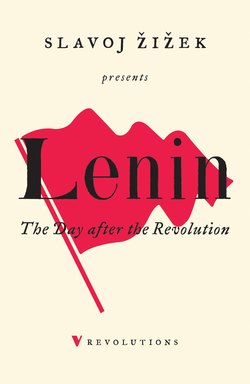Lenin 2017

Реклама. ООО «ЛитРес», ИНН: 7719571260.
Оглавление
Slavoj Žižek. Lenin 2017
Contents
Introduction: Remembering, Repeating and Working Through
Note on the Texts
To M. F. Sokolov
To G. Myasnikov
New Times and Old Mistakes in a New Guise
Notes of a Publicist. On Ascending a High Mountain; the Harm of Despondency; the Utility of Trade; Attitude towards the Mensheviks, Etc
Eleventh Congress of the RCP(B)
Memo Combating Dominant- Nation Chauvinism
‘Last Testament’ Letters to Congress
On Education (Pages from a Diary)
On Cooperation (Apropos of N. Sukhanov’s Notes)
Our Revolution (Apropos of N. Sukhanov’s Notes)
How We Should Reorganise the Workers’ and Peasants’ Inspection Recommendation to the Twelfth Party Congress
Better Fewer, but Better
To Comrade Stalin
To P. G. Mdivani, F. Y. Makharadze and Others
Afterword: Lenin Navigating in Uncharted Territories. by Slavoj Žižek
Notes
Sources
Отрывок из книги
Lenin 2017
Remembering, Repeating,and Working Through
.....
Take the situation in the Eastern European countries around 1990, when Really Existing Socialism was falling apart: all of a sudden, people were faced with the ‘freedom of political choice’. But were they really at any point asked the fundamental question of what kind of new order they actually wanted? Was it not rather that they found themselves in the exact situation of the subject-victim in a Beauvois-style experiment? They were first told that they were entering the promised land of political freedom; soon afterwards, they were informed that this freedom involved unrestrained privatisation, the dismantling of social security, and so on and so forth. They still had the freedom to choose, so, if they wanted, they could refuse to take this path; but, no, our heroic Eastern Europeans did not want to disappoint their Western tutors, so they stoically persisted in the choice they had never made, convincing themselves that they should behave as mature subjects who were aware that freedom has its price. This is why the notion of the psychological subject endowed with natural propensities, who has to realise its true Self and its potential, and who is, consequently, ultimately responsible for its own failure or success, is the key ingredient of liberal freedom.
This is where one should insist on reintroducing the Leninist opposition of ‘formal’ and ‘actual’ freedom: in an act of actual freedom, one dares precisely to break this seductive power of symbolic efficacy. Therein resides the moment of truth of Lenin’s acerbic retort to his Menshevik critics: the truly free choice is a choice in which I do not merely choose between two or more options within a pre-given set of coordinates; rather I choose to change this set of coordinates itself. The catch of the ‘transition’ from Really Existing Socialism to capitalism was that the Eastern Europeans never had the chance to choose the ad quem of this transition – all of a sudden, they were (almost literally) ‘thrown’ into a new situation in which they were presented with a new set of given choices (pure liberalism, nationalist conservatism …). What this means is that ‘actual freedom’, as the act of consciously changing this set, occurs only when, in the situation of a forced choice, one acts as if the choice is not forced and ‘chooses the impossible’. This is what Lenin’s obsessive tirades against ‘formal’ freedom are all about, and therein lies the ‘rational kernel’ that is worth saving today: when he insists that there is no ‘pure’ democracy, that we should always ask apropos of any freedom, whom does it serve, what is its role in the class struggle, his point is precisely to maintain the possibility of a true radical choice. This is what the distinction between ‘formal’ and ‘actual’ freedom ultimately amounts to: the former refers to freedom of choice within the coordinates of the existing power relations, while the latter designates the site of an intervention that undermines these very coordinates. In short, Lenin’s aim is not to limit freedom of choice, but to maintain the fundamental Choice – when he asks about the role of a freedom within the class struggle, what he is asking is precisely: ‘Does this freedom contribute to or constrain the fundamental revolutionary Choice?’
.....